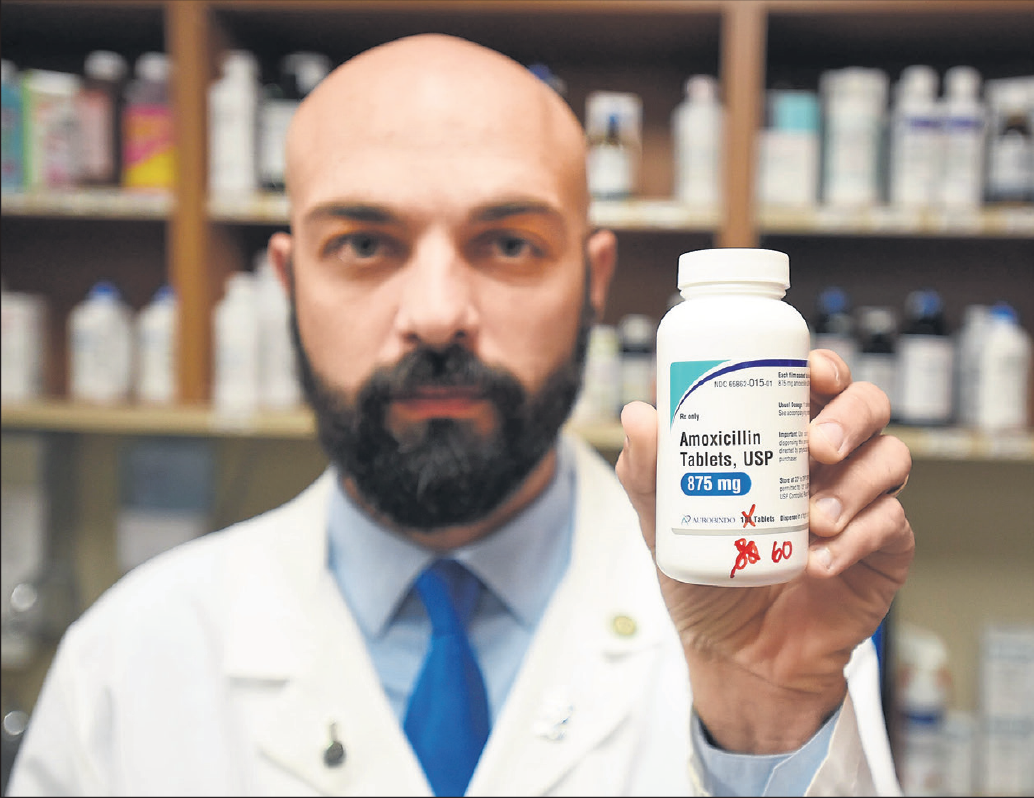Published on November 04, 2019
OH program aims to improve antibiotic use
By Renee Beasley Jones, Messenger Inquirer

Lance Smith, a pharmacist at Owensboro Health Regional Hospital, leads the health system’s Antimicrobial Stewardship Program, which was created to ensure optimal antibiotic use.
Kentucky medical providers rank No. 1 nationwide for prescribing antibiotics. It’s another Top 10 list the state should try to avoid. While most people think antibiotics are cure-alls, they are not. Often, these drugs are used too often and for the wrong purposes.
Also, many people believe antibiotics are benign drugs. Not true.
Besides causing side effects, their overuse can lead to something called “antibiotic resistance,” or germs’ ability to morph and mount defenses against drugs used to kill them.
Antibiotic resistance is one of the world’s most pressing public health issues.
“Each year in the U.S., at least 2 million people are infected with antibiotic-resistant bacteria, and at least 23,000 people die as a result,” the Centers for Disease Control and Prevention report.
The CDC estimates about 30% of antibiotics prescribed during outpatient visits are not needed.
To ensure optimal antibiotic use, Owensboro Health developed the Antimicrobial Stewardship Program in 2012. Lance Smith, one of the health system’s pharmacists, leads the initiative.
It’s a multidisciplinary approach that uses the expertise of doctors, infection preventionists, clinical educators, pharmacists and lab staff.
“We have our hands in every part of the hospital,” Smith said.
A CDC report touts hospital-based antimicrobial programs for improving patient care and safety through “increased infection cure rates, reduced treatment failures, and increased frequency of correct prescribing...”
More education about antibiotics is needed, Smith said. To begin, there are many misconceptions about this class of drugs.
For example, antibiotics are like any prescribed medicine. They have side effects. Some patients experience nausea, stomach cramps and vomiting.
Fluoroquinolones are a class of antibiotics often used to treat urinary tract infections and bronchitis. Since 2004, that drug has been linked to serious nerve damage.
They also are broad spectrum agents that are more likely to promote clostridium diffi cile, commonly known as C. Diff., a bacterium that occurs naturally in the environment.
“There’s been a growing amount of evidence these drugs are not as benign as once thought,” Smith said.
The Food and Drug Administration does not recommend the use of fl uoroquinolones unless no other option exists. Over the last couple of years, OHRH has reduced its use of that type of antibiotic by 90%, he said.
Since starting its Antimicrobial Stewardship Program, OH has pushed its “right drug, right patient, right dose at the right time” message out to the regional medical community. The health system has worked on outpatient education, distributing posters and fact sheets to clinics.
OH officials also have written an educational letter to all medical providers in the health system’s 15-county service area.
Efforts are paying off, Smith said. Physicians in outpatient clinics and urgent care centers call often to ask him questions about antibiotic prescriptions.
“They know we are working on this,” he said. “They know we have expertise in this area.”
About Owensboro Health
Owensboro Health is a nonprofit health system with a mission to heal the sick and to improve the health of the communities it serves in Kentucky and Indiana. The system includes Owensboro Health Regional Hospital, nationally recognized for design, architecture and engineering; Owensboro Health Muhlenberg Community Hospital; Owensboro Health Twin Lakes Medical Center; the Owensboro Health Medical Group comprised of over 350 providers at more than 30 locations; four outpatient Healthplex facilities, a certified medical fitness facility, the Healthpark; a weight management program, and the Mitchell Memorial Cancer Center.
On average each year, we have more than 19,000 inpatient admissions, deliver 2,000 babies and provide the region’s only Level III NICU. Owensboro Health physicians perform nearly 33,000 surgical procedures, including nearly 150 open-heart surgeries. Our physicians and staff have 90,000 Emergency Department visits and more than 1.25 million outpatient visits annually. Visit our home page for more information.